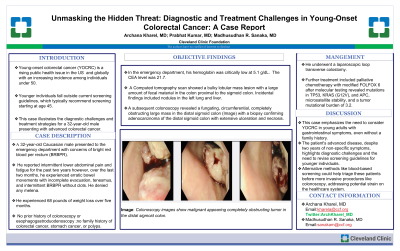Tuesday Poster Session
Category: Colorectal Cancer Prevention
P3878 - Unmasking the Hidden Threat: Diagnostic and Treatment Challenges in Young-Onset Colorectal Cancer: A Case Report
Tuesday, October 29, 2024
10:30 AM - 4:00 PM ET
Location: Exhibit Hall E

Has Audio

Archana Kharel, MD
Cleveland Clinic Foundation
Cleveland, OH
Presenting Author(s)
Archana Kharel, MD, Prabhat Kumar, MD, Madhusudhan R. Sanaka, MD
Cleveland Clinic Foundation, Cleveland, OH
Introduction: Young-onset colorectal cancer (YOCRC) is an emerging clinical concern, with an increasing incidence among individuals under 50 years of age. YOCRC is a rising public health issue in the United States and globally. Younger individuals fall outside current screening guidelines, which typically recommend screening starting at age 45. Initiating screening at earlier ages could place additional burdens on an already overwhelmed healthcare system. This case illustrates the diagnostic challenges and treatment strategies for a 32-year-old male presenting with advanced colorectal cancer.
Case Description/Methods: A 32-year-old Caucasian male presented to the emergency department with concerns of bright red blood per rectum (BRBPR). He reported intermittent lower abdominal pain and fatigue for the past two years; over the last two months, he experienced erratic bowel movements with incomplete evacuation, tenesmus, and intermittent BRBPR without clots. He denied any melena. He experienced 68 pounds of weight loss over five months. He had no prior history of colonoscopy or esophagogastroduodenoscopy and no family history of colorectal cancer, stomach cancer, or polyps. In the emergency department, his hemoglobin was critically low at 5.1 g/dL. The CEA level was 21.7. A Computed tomography scan showed a bulky lobular mass lesion with a large amount of fecal material in the colon proximal to the sigmoid colon. Incidental findings included nodules in the left lung and liver. A subsequent colonoscopy revealed a fungating, circumferential, completely obstructing large mass in the distal sigmoid colon (Image) with a biopsy confirming adenocarcinoma of the distal sigmoid colon with extensive ulceration and necrosis. He underwent a laparoscopic loop transverse colostomy. Treatment has been planned with palliative chemotherapy including modified FOLFOX 6 after molecular testing revealed mutations in TP53, KRAS (G12V), and APC, microsatellite stability, and a tumor mutational burden of 3.2.
Discussion: This case emphasizes the need to consider YOCRC in young adults with gastrointestinal symptoms, even without a family history. YOCRC often presents at an advanced stage, necessitating early diagnostic interventions. Alternative methods like blood-based screening could help triage these patients before more invasive procedures like colonoscopy, addressing potential strain on the healthcare system.

Disclosures:
Archana Kharel, MD, Prabhat Kumar, MD, Madhusudhan R. Sanaka, MD. P3878 - Unmasking the Hidden Threat: Diagnostic and Treatment Challenges in Young-Onset Colorectal Cancer: A Case Report, ACG 2024 Annual Scientific Meeting Abstracts. Philadelphia, PA: American College of Gastroenterology.
Cleveland Clinic Foundation, Cleveland, OH
Introduction: Young-onset colorectal cancer (YOCRC) is an emerging clinical concern, with an increasing incidence among individuals under 50 years of age. YOCRC is a rising public health issue in the United States and globally. Younger individuals fall outside current screening guidelines, which typically recommend screening starting at age 45. Initiating screening at earlier ages could place additional burdens on an already overwhelmed healthcare system. This case illustrates the diagnostic challenges and treatment strategies for a 32-year-old male presenting with advanced colorectal cancer.
Case Description/Methods: A 32-year-old Caucasian male presented to the emergency department with concerns of bright red blood per rectum (BRBPR). He reported intermittent lower abdominal pain and fatigue for the past two years; over the last two months, he experienced erratic bowel movements with incomplete evacuation, tenesmus, and intermittent BRBPR without clots. He denied any melena. He experienced 68 pounds of weight loss over five months. He had no prior history of colonoscopy or esophagogastroduodenoscopy and no family history of colorectal cancer, stomach cancer, or polyps. In the emergency department, his hemoglobin was critically low at 5.1 g/dL. The CEA level was 21.7. A Computed tomography scan showed a bulky lobular mass lesion with a large amount of fecal material in the colon proximal to the sigmoid colon. Incidental findings included nodules in the left lung and liver. A subsequent colonoscopy revealed a fungating, circumferential, completely obstructing large mass in the distal sigmoid colon (Image) with a biopsy confirming adenocarcinoma of the distal sigmoid colon with extensive ulceration and necrosis. He underwent a laparoscopic loop transverse colostomy. Treatment has been planned with palliative chemotherapy including modified FOLFOX 6 after molecular testing revealed mutations in TP53, KRAS (G12V), and APC, microsatellite stability, and a tumor mutational burden of 3.2.
Discussion: This case emphasizes the need to consider YOCRC in young adults with gastrointestinal symptoms, even without a family history. YOCRC often presents at an advanced stage, necessitating early diagnostic interventions. Alternative methods like blood-based screening could help triage these patients before more invasive procedures like colonoscopy, addressing potential strain on the healthcare system.

Figure: Colonoscopy images show malignant appearing completely obstructing tumor in the distal sigmoid colon.
Disclosures:
Archana Kharel indicated no relevant financial relationships.
Prabhat Kumar indicated no relevant financial relationships.
Madhusudhan R. Sanaka indicated no relevant financial relationships.
Archana Kharel, MD, Prabhat Kumar, MD, Madhusudhan R. Sanaka, MD. P3878 - Unmasking the Hidden Threat: Diagnostic and Treatment Challenges in Young-Onset Colorectal Cancer: A Case Report, ACG 2024 Annual Scientific Meeting Abstracts. Philadelphia, PA: American College of Gastroenterology.
